On a hot Wednesday afternoon in May, Victoria arrived at Rosa Parks Pop-up Pantry to pick up groceries like a gallon of milk, white mushrooms, and green onions for the older gentleman she provides home care for. She carried the bags out to the sidewalk and then paused to chat for a few minutes, shielding her face from the sun and setting down her heavy groceries. We learned she’s lived in San Francisco for 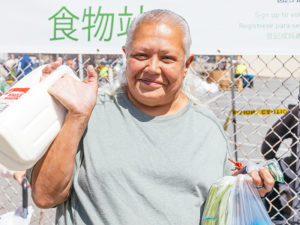 the past 40 years, and understandably, she’s seen the city change a lot in her time here. “When I came here [in the 80s], you could buy a thousand wonders for $50. You could fill the refrigerator for at least a month [for $50]. Now, everything is so expensive. There are times when there’s not enough to buy food. It’s terrible.”
the past 40 years, and understandably, she’s seen the city change a lot in her time here. “When I came here [in the 80s], you could buy a thousand wonders for $50. You could fill the refrigerator for at least a month [for $50]. Now, everything is so expensive. There are times when there’s not enough to buy food. It’s terrible.”
Working as a gardener and caretaker for seniors, San Francisco has been her home – the place where she says, with a twinkle in her eye, she has lived her “most beautiful life.” But while Victoria has seen SF through its fair share of economic ups and downs over the decades, including high inflation in the 80s, the current climate is unlike anything she’s seen before. These days, she’s trying to focus on the fact that “I’m okay, and the gentleman I take care of is okay – that’s what gives me peace.”
With grocery prices up 10% in the SF metro area, and gas prices soaring alongside them (up 43% compared to this time last year), the Food Bank is a lifeline for our community in this particularly challenging time.
Shrinking Savings
Like Victoria, many folks are worried. Every week we speak with community members like Arnoldo, who echo this feeling of constantly falling behind. Arnoldo has been coming to Cesar Chavez Pop-up Pantry ever since his small package delivery business in the Mission was forced to close during the pandemic. Without the income from his business, Arnoldo is left looking for work as a painter and scraping together what he can. He rents a room from a friend, but even sharing a space is expensive.
“Right now I don’t have a job, and all my bills are so high. The little savings I had, went straight to rent,” he said, shaking his head.
Impossible Choices
Sharon lives just a short walk from Rosa Parks Pop-up Pantry, and the groceries she picks up have been a huge help – she even told her friend Clifton about it, and now they come to the pantry together. But that doesn’t mean it’s erased the rest of her worries, especially operating on a fixed budget due to her disability income.
“We’re forced to make choices, you know? I literally don’t go grocery shopping. I can’t afford to. I’m caught, stuck between the choice of paying my housing and utility costs and purchasing food. So, I literally gave up on purchasing food, and without the Food Bank…” she trailed off, but the implication is obvious.
“Really Rough Right Now”
For Anna, sticker shock is just another worry on top of caregiving and supporting her parents, who are both disabled. Her dad needs 24/7 care, but hiring a full-time caregiver is financially out of reach. “My parents only get Social Security, and it isn’t enough, so I have to help them with rent,” she said. Right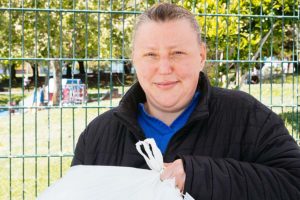 now, Anna is working anywhere from six to seven days a week as a nurse at Highland Hospital, and teaching UCSF nursing students as well. She stops by Cesar Chavez Pop-up Pantry to pick up food for her parents on her one day off.
now, Anna is working anywhere from six to seven days a week as a nurse at Highland Hospital, and teaching UCSF nursing students as well. She stops by Cesar Chavez Pop-up Pantry to pick up food for her parents on her one day off.
She leaned against the fence for a little support, watching kids play in the park next to the pantry while telling us about her situation. “It’s really rough right now. Everything is going up in price. It’s affecting me too, because I have to pay my own rent, my own food, the car and insurance – everything is going up in price now. I went to the store and the prices are crazy.”
Take Action
If you’re wondering why we’re still seeing so many folks at our pantries, two years into the pandemic – this is your answer. The pandemic has exacerbated issues that were already present – a housing/homelessness crisis, a cost of living that outpaces wages, the highest income inequality in the nation – and introduced new ones, like lingering isolation and mental health impacts from shelter-in-place.
That’s why we must keep pushing for comprehensive social safety nets that ensure the safety, dignity, and health and well-being of all in our community.
Reality Check
Over the course of our conversation, Anna grew reflective. She explained that growing up in Ukraine, she held an idealized image of life in the US – one that dissolved almost immediately when she moved to San Francisco in ‘95.
“I think before [my family] moved here, we thought a little differently about this country. Once we got here….it’s not as easy to live here as people think it is. When they show the US back home, it [seems] so glamorous, like money comes from the trees. When people move here, it’s a very different story.”
We owe it to our neighbors and ourselves to contend with that reality. Volunteer. Advocate. Donate.
Take Action
Join our Policy and Advocacy list to receive action alerts and be notified about opportunities to advocate for your neighbors.
Join


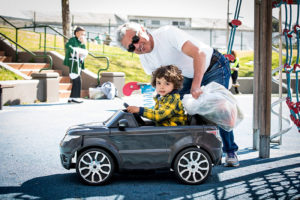 Other parents are more hesitant to let go of remote or homeschooling. Farzad is the single dad of 3-year-old Mehdi, as well as a musician, small business-owner, and participant at Cesar Chavez Pop-up Pantry. Farzad watches his son drive a toy car around the playground and sighs, shaking his head when asked about in-person preschool. He doesn’t “want Mehdi to go until COVID is over,” citing health concerns like maskless and unvaccinated children.
Other parents are more hesitant to let go of remote or homeschooling. Farzad is the single dad of 3-year-old Mehdi, as well as a musician, small business-owner, and participant at Cesar Chavez Pop-up Pantry. Farzad watches his son drive a toy car around the playground and sighs, shaking his head when asked about in-person preschool. He doesn’t “want Mehdi to go until COVID is over,” citing health concerns like maskless and unvaccinated children. 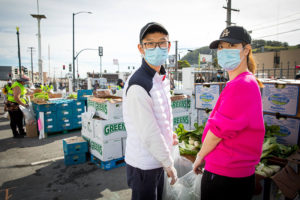 Wei Zong join other participant-volunteers in providing healthy groceries to their neighbors while also receiving food assistance themselves. For Jiakuang and his family, Thursday mornings at Cornerstone have been a time not only to receive and distribute food, but to mingle, talk, and laugh with other volunteers and food bankers.
Wei Zong join other participant-volunteers in providing healthy groceries to their neighbors while also receiving food assistance themselves. For Jiakuang and his family, Thursday mornings at Cornerstone have been a time not only to receive and distribute food, but to mingle, talk, and laugh with other volunteers and food bankers. 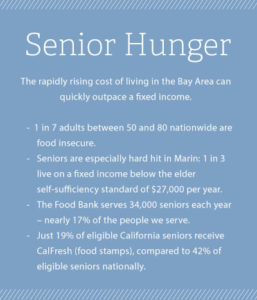 We first met Phillis (89) and Lee (81) in a line of cars waiting for groceries at the San Geronimo Valley Community Center’s
We first met Phillis (89) and Lee (81) in a line of cars waiting for groceries at the San Geronimo Valley Community Center’s 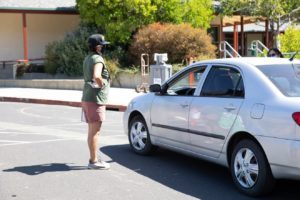
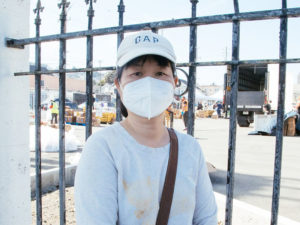 Like many,
Like many, 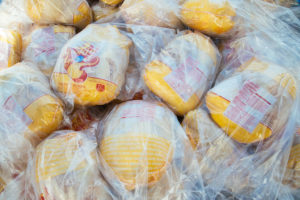 While families are finding ways to keep their traditions alive, many
While families are finding ways to keep their traditions alive, many 
Share